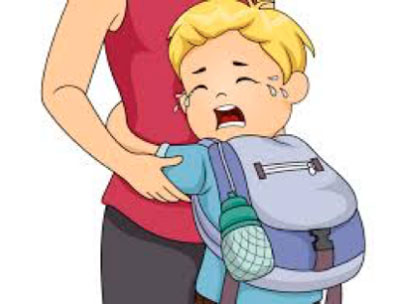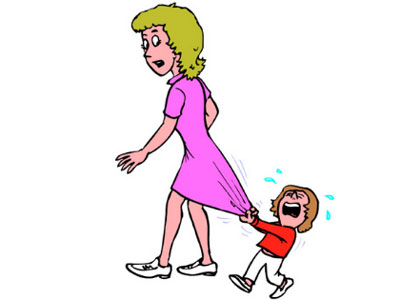 In our journey of understanding the Anxiety Disorder, we have discussed Anxiety and it’s several symptoms in detail. This blog is also about the next symptom of anxiety disorder, which is very common among children and adults. Separation anxiety is a normal stage of development for infants and toddlers. Young children often experience a period of separation anxiety, but most children outgrow separation anxiety by about 3 years of age. In some children, separation anxiety is a sign of a more serious condition known as separation anxiety disorder, starting as early as preschool age. Separation Anxiety is also associated with adults as well. Children 7 years old or older who show signs of being distressed when apart from their caregivers may be diagnosed with separation anxiety.
In our journey of understanding the Anxiety Disorder, we have discussed Anxiety and it’s several symptoms in detail. This blog is also about the next symptom of anxiety disorder, which is very common among children and adults. Separation anxiety is a normal stage of development for infants and toddlers. Young children often experience a period of separation anxiety, but most children outgrow separation anxiety by about 3 years of age. In some children, separation anxiety is a sign of a more serious condition known as separation anxiety disorder, starting as early as preschool age. Separation Anxiety is also associated with adults as well. Children 7 years old or older who show signs of being distressed when apart from their caregivers may be diagnosed with separation anxiety.
 An adult’s separation anxiety can stem from a parent, partner, or a child who moves away. Their anxiety may also be related to another underlying mental health condition. These may include delusions from psychotic disorders or fear of change relating to an autism spectrum disorder. On occasion, people may categorize an adult with a separation anxiety disorder as being controlling or overprotective. However, their actions are often an adult’s way of expressing their fears in regard to separation.
An adult’s separation anxiety can stem from a parent, partner, or a child who moves away. Their anxiety may also be related to another underlying mental health condition. These may include delusions from psychotic disorders or fear of change relating to an autism spectrum disorder. On occasion, people may categorize an adult with a separation anxiety disorder as being controlling or overprotective. However, their actions are often an adult’s way of expressing their fears in regard to separation.
What Causes Separation Anxiety Disorder?
Separation anxiety often develops after a significant stressful or traumatic event in the child’s life, such as a stay in the hospital, the death of a loved one or pet, or a change in environment (such as moving to another house or a change of schools). Children whose parents are over-protective may be more prone to separation anxiety. In fact, it may not necessarily be a disease of the child but a manifestation of parental separation anxiety as well — parent and child can feed the other’s anxiety. In addition, the fact that children with separation anxiety often have family members with anxiety or other mental disorders suggests that a vulnerability to the disorder may be inherited.
Symptoms
Separation anxiety disorder is diagnosed when symptoms are excessive for the developmental age and cause significant distress in daily functioning. Symptoms may include:
- Recurrent and excessive distress about anticipating or being away from home or loved ones
- Constant, excessive worry about losing a parent or other loved one to an illness or a disaster
- The constant worry that something bad will happen, such as being lost or kidnapped, causing separation from parents or other loved ones
- Refusing to be away from home because of fear of separation
- Not wanting to be home alone and without a parent or other loved one in the house
- Reluctance or refusing to sleep away from home without a parent or other loved one nearby
- Repeated nightmares about separation
- Frequent complaints of headaches, stomachaches or other symptoms when separation from a parent or other loved one is anticipated
Separation anxiety disorder may be associated with panic disorder and panic attacks ― repeated episodes of sudden feelings of intense anxiety and fear or terror that reach a peak within minutes.
Treatment and management options
Doctors treat separation anxiety primarily through psychotherapy. Other available options are:
- Support groups: A person may also wish to seek out a support group for those with anxiety and separation anxiety. People who join these groups can gain help with learning techniques for reducing separation-related anxiety. While adult separation anxiety is not as common as when a child experiences this condition, it is still possible that a person can have separation anxiety as an adult. The anxiety can be so intense that it is hard for someone to function in daily life due to fears and worries about separating from another person. People should see a mental health professional if they are not sure if their fears are related to separation.
- Cognitive-behavioral therapy (CBT): This therapy aims to help a person identify their thoughts and behaviors that are making their separation anxiety worse. Parents may also learn additional parenting techniques that can reduce their separation anxiety. Sometimes an individual can benefit from group therapy and family therapy.
- Anti-anxiety medication: Doctors may also temporarily prescribe anti-anxiety medications to help a person through their most acute symptoms of separation anxiety. These drugs, however, are not always long-term solutions to the underlying disorder, and some types of anti-anxiety medications can be addictive. A person should engage in therapy so they can begin to change their ways of thinking to reduce the incidence of separation anxiety.
References:
- https://www.ncbi.nlm.nih.gov/pubmed/11460893
- https://www.therecoveryvillage.com/mental-health/separation-anxiety/related/separation-anxiety-statistics/
- https://barendspsychology.com/adult-separation-anxiety/adult-separation-anxiety-2/
- https://www.therecoveryvillage.com/mental-health/separation-anxiety/#gref
- https://www.visionpsychology.com/separation-anxiety-disorder-in-children/
Vipin Kumar Tanwar is associated with Psycho-social clinical studies from the last six years. He has graduated with a Masters Degree in Clinical Psychology with a keen interest in establishing the Philosophy of relationship between Psychology and our Society. He is now working with Syngrity Transformational Solutions.
“Man knows much more than he understands.” – by Alfred Adler









 MALATI VASUDEVA
MALATI VASUDEVA VIKRAM BADHWAR
VIKRAM BADHWAR PRIYANKA KUMAR
PRIYANKA KUMAR SUMAL VARGHESE
SUMAL VARGHESE















Thanks Vipin for sharing this useful blog. Surely it will helps to understand the menace of separation anxiety effected children’s of working parents those leaving behind them to creche or other arrangements.
Thank you sir